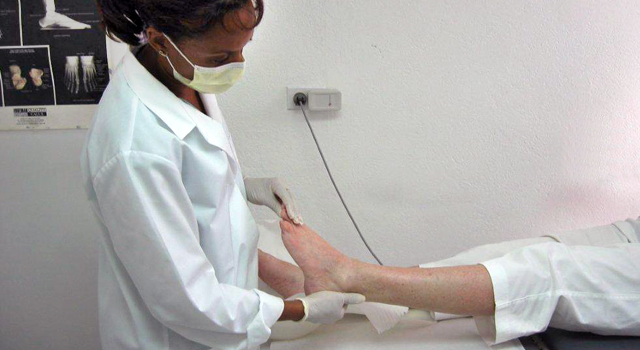Amputations
Amputations. This is a bad word to most of us especially if you are diabetic. As there are approximately 150 amputations in Barbados annually and Barbados being labelled the “amputation centre of the world” one must be fearful.
How many times do you hear he or she only went into hospital with a bad toe or a pain in their toe and came out with an amputation whether it was an
amputation of that same toe or a below or above knee amputation. There is the odd individual who actually knows that when they go into hospital they
will be going for an amputation.
Amputations to the general public seem to be free and easy to get once you are admitted to hospital. Not so.
Many a time it is the delay that causes the amputation in the first place.
Delay from the point of view of the average diabetic coming to terms with the fact they have diabetes. Most diabetics see this as a death sentence and find it hard to understand that all it takes is a healthy diet and a healthy attitude to daily living. Whether we are diabetic or not a healthy diet is essential for all healthy persons.
Delay as in not understanding the complications that can occur as a result of having long term poorly controlled diabetes. That is, when your diabetes is not well controlled you are at a greater risk of increasing the speed and severity of the manifestation of your diabetic complication. Attempting to “cheat” on your doctors so you do not get chastised is cheating on your health not your doctor’s health.
Delay as in not knowing when early signs of diabetic complications have set in and taking the necessary precautions. For example:
- neuropathy or nerve damage, which affects the awareness of painful sensations or feeling to the feet
- ischaemia or loss of an adequate blood flow to the foot.
Therefore a nail puncture which tends to be very common, or use of ill-fitting shoes causes rubbing and damage to the foot which never seems to be as bad from the patients’ point of view because they have not accepted (sometimes not realised) the fact that they have altered sensations/feeling in their feet.
Delay as in when there is a problem, home remedies are used or and listening to neighbours and friends for assistance and these persons are not necessarily qualified to give correct information in other words not seeking early assistance from a doctor, nurse or podiatrist.
Amputations can be either due to:
- Trauma – those that occur as a result of a motor vehicle accident etc.
- Peripheral Vascular disease/Ischaemia/Poor circulation – those who have developed narrowing of the arteries due to years of diets and lack of exercise to name a few of the causes of arterial narrowing. This reduces the blood supply to the feet and eventually they develop gangrene.
- Diabetic complications that include peripheral vascular disease, neuropathy and the inability of mounting an adequate immune response to infection.
A classic scenario can be one of a poorly controlled diabetic who has developed these complications and or is unaware of the consequences. Wears a poorly fitting pair of shoes or walks around barefooted and gets injured and do not recognise they have injured themselves because they have loss feeling in their feet (neuropathic). They do not pay their feet much attention so in a few days, sometimes a few hours, they either have a hot, swollen, foot which stops them from getting on a shoe or it gives a little pain when really it should be giving a lot of pain (but because of the lack of pain they do not think it is serious). A friend may come over and smell an odd scent that leads them to the direction of the foot and it is noted that the foot is the thing causing such an odour. This is just a scenario that can (and unfortunately does) occur but the point is delay. Delay can make a bad situation worse. In such cases these type of scenarios can lead to having a “get-a-away” (holiday/ vacation) at the hospital for not less than 3 months and this may lead to an amputation.
Another common scenario involves poor circulation, where due the lack of an adequate blood supply to the foot, the tissues become starved, and as our tissues do not survive without a blood supply they start to die. This leads to gangrene; another dreaded term. There is wet and dry gangrene. Depending on the nature of the gangrene it may not be all bad. In some cases once there is adequate blood supply to surrounding tissues the only part that needs to be lost is the gangrenous area. However should it develop to result in an amputation, the average person tends to become very sedentary and a few years later go on to loose their other leg.
As depressing as this may seem these are the realities of our society. Control your diabetes, exercise (no one is too old to exercise), and do not delay. Prevention is better than a cure and a stitch in time saves nine can be related to our amputation situation. Use your doctors, your dieticians, your podiatrists to your advantage and let us exercise some control in our amputations. Do not delay.
Written By Simone Lorde BSc Pod Med (UK) – Podiatrist
